As a content creator for payoffsong.com, I’m diving into the captivating world of animated movie soundtracks, specifically focusing on a non-Disney masterpiece: The Prince of Egypt. While Disney often dominates discussions in animation, The Prince of Egypt stands tall, particularly for its breathtaking musical score. For a long time, I’ve been eager to explore this film, and it was revisiting its soundtrack that sparked the perfect angle: the music itself. The Prince of Egypt boasts some of the most emotionally resonant and powerful songs ever composed for an animated feature. It’s fascinating to observe how its musical approaches both align with and diverge from Disney’s signature style. Let’s embark on a journey through each song, from the powerful opening to the inspiring finale, beginning with one of the movie’s most iconic tracks: Deliver Us.
Deliver Us / River Lullaby: A Dual Plea for Salvation
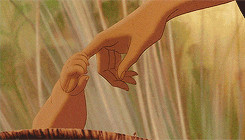 Image depicting the River Lullaby scene from The Prince of Egypt
Image depicting the River Lullaby scene from The Prince of Egypt
Often presented together due to their seamless integration in the film’s opening, Deliver Us and the River Lullaby form a potent introduction to The Prince of Egypt.
Deliver Us stands out as one of the most impactful opening sequences in animated movie history. The sheer desperation and anguish conveyed through the music are palpable, creating chills with every listen. This is the Hebrews’ “I Want” song, a heartfelt cry to Elohim, their God, for liberation from Egyptian slavery and guidance to the promised land. The lyrics powerfully articulate their yearning:
Elohim, God on high,
Can you hear your people cry?
Help us now, this dark hour
Deliver us, hear our call
Deliver us, Lord of all
Remember us, here in this burning sand
Deliver us
There’s a land you promised us
Deliver us to the promised land
As Deliver Us transitions into the River Lullaby, a profound dual meaning of “deliverance” emerges. Beyond the Hebrews’ collective plea for freedom, it becomes a mother’s desperate prayer for her infant son, Moses, to escape the horrific decree of infanticide. She seeks to shield him from the fate of other Hebrew newborns drowned by the Egyptians, a sacrifice that tears at her heart as she sets him adrift. The lullaby becomes her poignant farewell and hope:
My son, I have nothing I can give
But this chance that you may live
I pray, we’ll meet again
If He will deliver us
The bravery of Moses’ mother in this moment is truly awe-inspiring. The preceding montage depicts her and her family navigating a perilous escape to the riverbank, dodging Egyptian soldiers at every turn. Their successful arrival feels miraculous. This is a mother entrusting her child to the mercy of the river, praying it will carry him to safety, to “somewhere he can be free.” Such faith and resilience are deeply moving.
As baby Moses is carried away, young Miriam’s prayer adds another layer of emotional depth, echoing her mother’s hopes:
Grow, baby brother
Come back someday
Come and deliver us, too
This early prayer foreshadows Miriam’s crucial role later in Moses’ life. The film beautifully connects the past and present when Miriam, upon reuniting with Moses, subtly reprises the River Lullaby. This callback resonates eerily with Moses, who is haunted and intrigued by the familiar tune sung by a stranger, and poignantly for the audience, creating a powerful emotional echo:
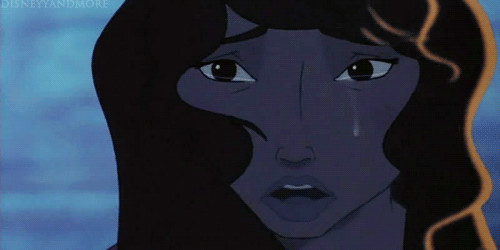 GIF of Miriam singing the River Lullaby to Moses as an adult in The Prince of Egypt
GIF of Miriam singing the River Lullaby to Moses as an adult in The Prince of Egypt
This moment serves as a powerful “blast from the past,” reminding both Moses and the viewers of the deep roots of his identity.
A final, subtle detail that elevates the song is the inclusion of Hebrew lyrics. This thoughtful touch showcases the filmmakers’ dedication to authenticity and adds a layer of cultural richness to the movie. The lullaby Moses’ mother sings to soothe him is in Hebrew, adding to its tenderness and historical context:
Yaldi hatov veh harach (My good and tender son)
Al tira veh al tifchad (Don’t be frightened and don’t be scared)
This small detail speaks volumes about the care and research invested in The Prince of Egypt‘s music.
All I Ever Wanted: Moses’ Song of Denial and Disillusionment
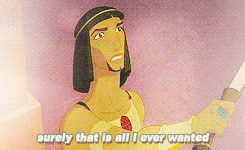 GIF of Moses looking conflicted during All I Ever Wanted in The Prince of Egypt
GIF of Moses looking conflicted during All I Ever Wanted in The Prince of Egypt
 GIF of Moses walking through Egyptian palace halls in All I Ever Wanted from The Prince of Egypt
GIF of Moses walking through Egyptian palace halls in All I Ever Wanted from The Prince of Egypt
All I Ever Wanted presents an intriguing twist on the classic Disney “I Want” song. In Moses’ case, it becomes an “I Wanted” song, reflecting his shattered illusions and the painful confrontation with his true heritage. After Miriam reveals the truth, Moses is forced to confront the reality that his life has been built on a lie, his perception of the world filtered through privilege.
This song is steeped in denial. Moses clings to the opulent trappings of his Egyptian life – “sweet perfumes of incense, graceful rooms of alabaster stone” – but these luxuries ring hollow as he witnesses the suffering of the enslaved Hebrews. He desperately tries to convince himself of his belonging, singing “if anybody doubts it, they couldn’t be more wrong,” even as doubt gnaws at his own heart. He is determined to maintain the facade of his identity, yet his internal struggle is increasingly evident.
The musical staging of All I Ever Wanted is particularly effective. Instead of a typical performance, the song plays almost as Moses’ internal monologue, a soundtrack to his turbulent thoughts as he navigates his familiar yet suddenly alien world. Even as he sings of being “a son of a proud history,” his facial expressions betray doubt, confusion, and growing anxiety. The repetition of “all I ever wanted” becomes increasingly strained, until, slumped against a statue, he confronts the realization that his past desires are no longer sufficient.
All I Ever Wanted (The Queen’s Reprise): A Mother’s Plea for Ignorance
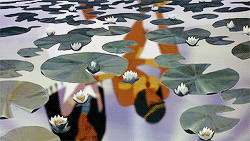 GIF of Queen Tuya singing in The Prince of Egypt during her reprise of All I Ever Wanted
GIF of Queen Tuya singing in The Prince of Egypt during her reprise of All I Ever Wanted
The Prince of Egypt innovatively repurposes the All I Ever Wanted theme by assigning a reprise to Queen Tuya, Moses’ adoptive mother. While Moses grapples with his identity crisis, the Queen attempts to soothe his turmoil, reassuring him of his rightful place within the Egyptian royal family:
Here the river brought you
And it’s here the river meant
To be your home
On the surface, these words seem comforting, reinforcing the idea of destiny and belonging. She portrays his arrival as divinely ordained, meant to happen exactly as it did. However, a closer look reveals a darker undercurrent:
Now you know the truth, love
Now forget and be content
When the gods send you a blessing
You don’t ask why it was sent…
While seemingly tender, these lines are, in fact, chilling. The Queen is advocating for willful ignorance, urging Moses to suppress his newfound knowledge and return to blissful unawareness. Her line, “You don’t ask why it was sent,” is particularly disturbing, given her intimate knowledge of Moses’ origins. She is acutely aware of the genocide enacted by her husband and the countless Hebrew babies drowned in the Nile. Yet, she implores Moses not to question his past, actively promoting ignorance as a path to contentment.
Though her words offer temporary solace, they ultimately fail to quell Moses’ growing unease. Her reprise acts as a superficial bandage on a deep wound, unable to halt the inevitable unraveling of Moses’ Egyptian identity.
Through Heaven’s Eyes: Finding Purpose and Redemption
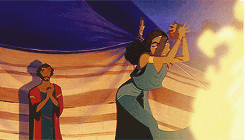 GIF of Moses and Jethro dancing during Through Heaven's Eyes in The Prince of Egypt
GIF of Moses and Jethro dancing during Through Heaven's Eyes in The Prince of Egypt
Through Heaven’s Eyes is another standout track, loved for its uplifting melody and profound message. It also features a visually stunning time-lapse sequence showcasing Moses’ integration into Midianite society.
The song’s core theme revolves around self-worth and adopting a more optimistic perspective on life, specifically, viewing one’s life “through Heaven’s eyes.” It marks a turning point for Moses, who transitions from arrogance and self-importance to a state of profound humility and self-doubt. He struggles to find value in himself after losing his privileged Egyptian identity. This song becomes his journey of rebuilding self-esteem and evolving into a more compassionate individual. He begins to see the world with newfound clarity and purpose, prompting significant personal growth.
The opening stanza beautifully sets the stage for this transformation:
A single thread in a tapestry,
Though its color brightly shines,
Can never see its purpose
In the pattern of the grand design
This metaphor highlights the limitations of individual perspective. No single person can fully grasp their purpose when isolated from the larger community and divine plan. This resonates deeply with Moses, who has been grappling with his lost sense of self. He needs to find his place within a larger context to understand his true purpose. Much of the accompanying montage in Through Heaven’s Eyes depicts Moses finding this place, connecting with the Midianite people and falling in love with Tzipporah. It’s through this connection and newfound sense of belonging that Moses rediscovers his self-worth and purpose.
The lyrics poignantly reflect Moses’ personal struggles. The song questions if a man has “lost his worth” if he “should lose everything he owns,” a central conflict for Moses. Stripped of his riches, heritage, and title, he questions his very identity.
So how do you measure the worth of a man, in wealth or strength or size?
In how much he gained, or how much he gave?
Moses’ character arc hinges on this very question: how to redefine himself after losing everything that once defined him. He learns that true worth is not measured by material possessions or social status, but by his actions and contributions to others. By adopting “Heaven’s eyes,” he begins to measure his life by what he gives, not what he possesses.
No life can escape being blown about
By the winds of change and chance
And though you never know all the steps,
You must learn to join the dance
Moses’ central struggle during this song is re-engaging with life’s “dance.” Initially, he observes the Midianites dancing with a sense of wistful detachment, hesitant to participate. However, life, like a dance, cannot be avoided. When Tzipporah pulls him into the dance, he surrenders to its rhythm. This scene carries a dual symbolism: Moses literally joins the dance, and metaphorically rejoins the dance of life. Embracing the uncertainty of the future, he learns to accept life’s unpredictable nature and forge a new identity he can be proud of. He finally begins to see his life “through Heaven’s eyes,” embracing his new path.
Playing with the Big Boys: Illusion vs. True Power
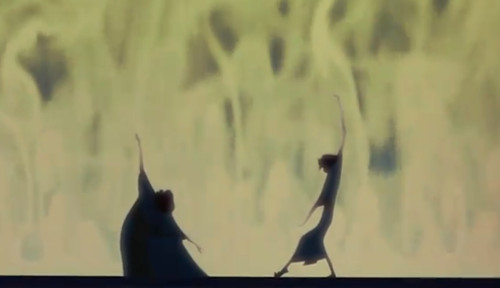 Image of Hotep and Huy performing magic tricks in Playing with the Big Boys from The Prince of Egypt
Image of Hotep and Huy performing magic tricks in Playing with the Big Boys from The Prince of Egypt
Playing with the Big Boys serves as the film’s “villain song,” showcasing the smug arrogance of Hotep and Huy, the Egyptian high priests. The song’s central theme is the contrast between deceptive illusions and authentic divine power.
Hotep and Huy exude condescension, patronizing Moses as “boy” and belittling his abilities (“pick up your silly twig, boy”). They boast of their superior power and attempt to intimidate him into submission through taunts and trickery:
Stop this foolish mission
Watch a true magician
Give an exhibition how
Crucially, all of Hotep and Huy’s “magic” is shrouded in darkness, smoke, or misdirection, typical of stage illusions. The film never provides concrete evidence of genuine magical abilities. Their power lies in deception and masterful illusion, “smoke and mirrors.”
Moses, in contrast, conjures a snake in broad daylight, without any trickery. Yet, his display is initially dismissed, deemed less impressive than the priests’ theatrics. They attempt to outdo him by “conjuring” snakes of their own, relying on darkness and suggestion. (The plausibility of their sticks actually turning into snakes is deliberately ambiguous, especially given the obscured setting). What happens next underscores the difference between illusion and reality?
Moses’ snake devours their illusions, right in the midst of their boastful performance. Caught up in their own spectacle, they remain oblivious to their defeat. This epic “fail” highlights the superficiality of Hotep and Huy’s power. While they command the flashier show, they lack genuine power. Even as much of Egypt ignores the signs (a decision they soon regret), Moses demonstrates the true power of God working through him.
The Plagues: Divine Wrath and Brotherly Conflict
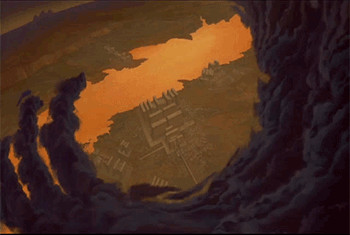 GIF of swirling red clouds during The Plagues song from The Prince of Egypt
GIF of swirling red clouds during The Plagues song from The Prince of Egypt
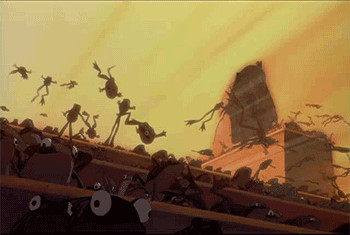 GIF of frogs invading Egypt during The Plagues song from The Prince of Egypt
GIF of frogs invading Egypt during The Plagues song from The Prince of Egypt
The Plagues is a chilling and dramatic centerpiece of the film. It unflinchingly portrays the devastating consequences of the escalating conflict between Moses and Ramses, impacting both Egyptians and Hebrews alike. The visual chaos is overwhelming: swarms of frogs, infestations of pests, fiery hail destroying homes, and the river turning to blood. This is the full force of divine wrath unleashed upon Egypt. The lyrics are equally stark and unsettling:
I send a pestilence and plague
Into your house, into your bed
Into your streams, into your streets
Into your drink, into your bread
Upon your cattle, on your sheep
Upon your oxen in your field
Into your dreams, into your sleep
Until you break, until you yield
The plagues escalate in severity, from mere annoyances to widespread devastation, culminating in death and destruction. The repeated phrase, “until you break, until you yield,” underscores the song’s purpose: to break Ramses’ stubborn resistance. His refusal to release the Hebrews is the root cause of Egypt’s suffering, and God’s plagues are designed to dismantle his pride and force his hand. However, Ramses’s unwavering obstinacy prolongs the agony and intensifies the plagues.
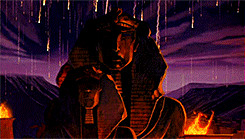 GIF of Moses looking conflicted during The Plagues song in The Prince of Egypt
GIF of Moses looking conflicted during The Plagues song in The Prince of Egypt
A particularly compelling aspect of The Plagues is the portrayal of Moses’ internal turmoil. He is torn between his past life in Egypt, his bond with Ramses, and his loyalty to his people. A poignant echo of All I Ever Wanted surfaces as Moses reflects on his former desires:
Once I thought the chance
To make you laugh
Was all I ever wanted
Moses is trapped in an agonizing dilemma. He understands the necessity of his actions, yet laments the devastating consequences. He expresses a deep wish “that God had chose another…serving as your foe on his behalf is the last thing that I wanted.”
His anger towards Ramses is palpable, fueled by the immense suffering inflicted on innocent Egyptians and Hebrews alike due to Ramses’ “stubbornness and pride.” Moses’ pleas evolve into demands, insisting Ramses release his people. But Ramses’ response reveals his tragic flaw:
 GIF of Ramses looking defiant during The Plagues song in The Prince of Egypt
GIF of Ramses looking defiant during The Plagues song in The Prince of Egypt
Ramses’ portion of the song is characterized by self-centeredness and blame-shifting. Instead of introspection and remorse, he directs his anger at Moses:
You who I called brother
How could you have come to hate me so?
Is this what you wanted?
Ramses completely misinterprets Moses’ motivations. Had he been attentive, he would have recognized that Moses’ sole desire was the freedom of his people. Ramses possesses the power to end the plagues and alleviate the suffering, yet he chooses defiance. He is presented with a clear choice, and he chooses wrongly.
Then let my heart be hardened
And never mind how high the cost may grow
This will still be so:
I will never let your people go…
Ramses’ callous disregard for human suffering is chilling. He prioritizes his pride and power above the well-being of his own people and the enslaved Hebrews. He is so consumed by self-importance that it takes the ultimate tragedy – the loss of his son – to finally break his resolve and release the Hebrews. Even then, his repentance is short-lived, as he pursues them in a final act of futile aggression. Ramses’ inability to learn from his mistakes ultimately leads to his isolation and downfall.
When You Believe: Hope, Faith, and Miracles
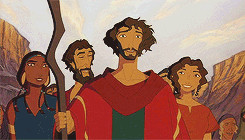 GIF of Moses and the Hebrews walking towards the Red Sea in When You Believe from The Prince of Egypt
GIF of Moses and the Hebrews walking towards the Red Sea in When You Believe from The Prince of Egypt
When You Believe is often considered the quintessential “awards bait song,” and while undeniably polished and commercially appealing, it carries a powerful message of hope and faith.
The opening verse directly echoes the film’s beginning, creating a sense of cyclical journey and fulfilled prophecy:
Many nights we prayed
With no proof anyone could hear
In our hearts a hopeful song
We barely understood
This immediately recalls the opening of Deliver Us, drawing a direct parallel between the Hebrews’ initial desperate prayers and their eventual liberation. The song’s core message then unfolds:
There can be miracles
When you believe
Though hope is frail
It’s hard to kill
Who knows what miracles
You can achieve
When you believe
“Though hope is frail, it’s hard to kill” is a particularly poignant and resonant line. The Hebrews have endured generations of enslavement, their hope tested and seemingly extinguished countless times. Now, on the verge of freedom, they stand as testament to the enduring power of hope.
In this time of fear
When prayer so often proves in vain
Hope seems like the summer birds
Too swiftly flown away
Yet now I’m standing here
My heart’s so full I can’t explain
Seeking faith and speaking words
I never thought I’d say
The song’s lyrical beauty is undeniable. The metaphor of hope as “summer birds, too swiftly flown away” poignantly captures the fleeting and fragile nature of hope in desperate circumstances. These verses acknowledge the pervasive doubt and despair that the Hebrews must have faced. Years of unanswered prayers could easily erode faith. Yet, in this moment of liberation, their hearts overflow with a joy and gratitude that transcends words. They are on the cusp of the promised land, their faith rewarded.
Ultimately, When You Believe encapsulates the film’s central theme: the transformative power of faith and the possibility of miracles when belief persists, even in the darkest of times.
(Lyrics Source: ST Lyrics: http://www.stlyrics.com/p/princeofegypt.htm)
What resonates most with you in The Prince of Egypt soundtrack? Which song is your personal favorite, and are there other animated movie scores you’d like to see explored? Share your thoughts in the comments below!
Follow Animated Meta on Twitter and Tumblr for more animation insights. Have a wonderful day!
Cheers,
M&M
Share this:
Like Loading…

